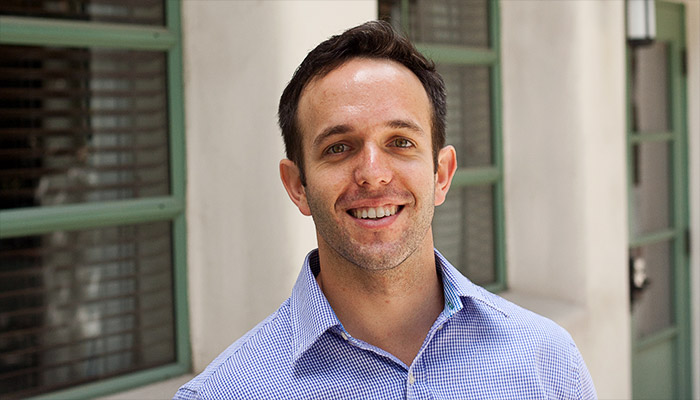
Micah Schub was eight years old when he first started playing violin. Two years later he switched to the double bass, and by the time he was a senior in high school Schub was playing in honor orchestras on a state and national level. He has a bachelor of music degree from The Juilliard School, a master’s from the Manhattan School of Music, and was involved in the creation of Cirque du Soleil’s “Iris” with composer Danny Elfman.
But now he’s set his sights on a different path: medicine. And the Scripps College Post-Baccalaureate (Post-Bac) Premedical Program is taking him there.
“I entertained the idea of switching from music to medicine starting in my sophomore year at Juilliard, but it was November of 2012 when I finally made the decision,” he says. “I loved having an impact like I had as a musician. I wanted to have a greater impact on the world around me, and I wanted greater job stability in a growing field. Medicine met all of my criteria.”
Post-Bac is a 13-month, highly selective academic program that prepares college graduates for the rigors of medical school. It has one of the highest placement rates in the country and admits some of the most eclectic students imaginable; Schub’s classmates include a professional bike racer, a Peace Corps volunteer, and a design architect, and previous years have seen professional football player on campus.
“Everyone was successful at something else before they came to Scripps, and it’s great to see how we apply our varied skills and high level of work ethic to our schooling,” he says.
Students in the Post-Bac program take classes with undergraduate Scripps, Pitzer, and Claremont McKenna College students through the W.M. Keck Science Department. With the same, some consider it an abbreviated and intense version of the typical Scripps learning experience.
“The program is a turning point in the lives of our students,” says DeEttra Mulay, director of Post-Bac. “Our goal is to provide a supportive learning environment and guidance as students achieve their dream of becoming physicians.”
Schub is pleased with his Scripps experience and hopes other working professionals can follow the same path to their doctorate.
“A massive career change is scary and Scripps is very supportive,” he says. “The College provides tremendous amounts of guidance and the course work, volunteer opportunities, and interaction with other pre-med students has only reinforced my desire to pursue medicine.”
Will he still pick up a bass from time to time? Yes, he plans.
“The work ethic and ability to perform under pressure that I learned as a musician benefit me as a student on a daily basis,” he says. “But my next goal in music is to be the principal bass of the LA Doctors Orchestra.”
Micah will begin medical school in August 2014 at the University of Pittsburgh.

